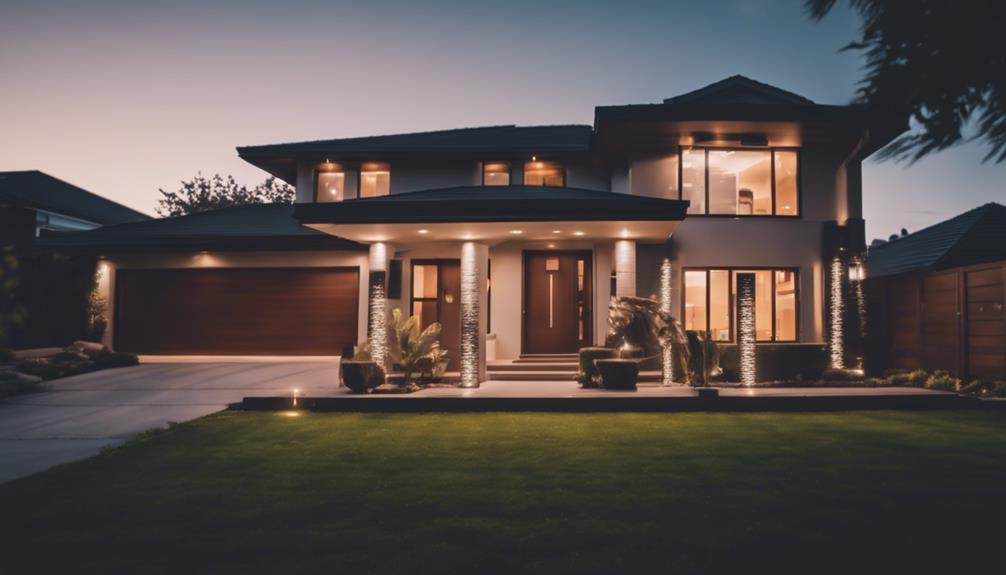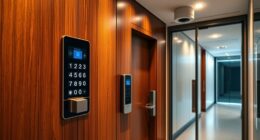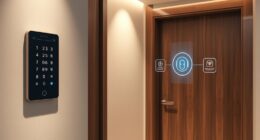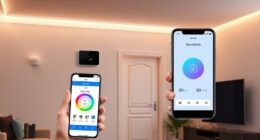Home security systems protect your property by connecting different components that monitor for threats. Sensors placed at entry points detect motion and unauthorized access. When triggered, these sensors alert the control panel, which activates the alarm. You can choose between professional monitoring for 24/7 surveillance or self-monitoring, where notifications go directly to your phone. Many systems use wireless technology for easy installation, allowing seamless integration with smart home devices. Additionally, you can manage alerts through a mobile app. If you want to learn more about optimizing your system, consider exploring the various components and monitoring options available.
Key Takeaways
- Home security systems use sensors to detect motion and unauthorized access at entry points, triggering alerts when breaches occur.
- The control panel serves as the central hub, communicating with all connected devices to activate alarms and notifications.
- Users can choose between professional monitoring for 24/7 surveillance or self-monitoring, which sends alerts directly to mobile devices.
- Modern systems often integrate with smart home technology, allowing easy management through mobile apps and cloud storage for recorded footage.
Overview of Home Security Systems
Home security systems are essential tools that protect your home by using interconnected components like cameras, sensors, and alarms to monitor for intrusions and hazards. These systems can also include smart features like mobile app control and remote monitoring, allowing homeowners to keep an eye on their property even when they’re away. Proper installation and maintenance of home security system wiring is crucial to ensure all components work effectively and communicate seamlessly with each other. Investing in a reliable home security system can provide peace of mind and a sense of security for you and your loved ones.
At the heart of these systems are sensors strategically placed at entry points and high-traffic areas. These sensors detect motion and unauthorized access, sending alerts to a central control panel that manages the entire system.
When a sensor is triggered, the control panel activates the alarm system, notifying you or directly contacting monitoring services for assistance. You have the option of self-monitored home security, where you receive alerts on your mobile device, or opting for professional monitoring that operates 24/7. This means you can always rest easy knowing your home is under constant watch.
Many modern systems use a wireless security system, allowing for easier installation and flexibility.
Security cameras are often integrated into these systems, providing real-time footage and additional peace of mind.
Studies reveal that homes equipped with visible security systems are less likely to be targeted, reinforcing the effectiveness of a well-implemented home security system in deterring potential intruders.
Key Components of Security Systems

A security system relies on several key components, including cameras, motion detectors, and sensors, to effectively safeguard your home. Understanding these parts helps you appreciate how they work together to provide extensive protection.
| Component | Functionality |
|---|---|
| Security Cameras | Provide visual monitoring and can include night vision. |
| Motion Sensors | Detect movement and reduce false alarms by distinguishing between pets and humans. |
| Door/Window Sensors | Monitor entry points and alert the system when opened unexpectedly. |
| Control Panel | Acts as the central hub to communicate with all devices. |
| Mobile App | Allows you to manage your alert system and receive notifications. |
The control panel coordinates everything, ensuring that your security cameras, motion sensors, and door/window sensors work in unison. When any sensor detects unusual activity, the alert system notifies you via the mobile app, keeping you informed in real time. By combining these elements, you're setting up a robust defense against potential threats, while also enabling visual monitoring of your property. With the right components, you can enhance your home's safety and gain peace of mind.
Monitoring and Response Options

When choosing a security system, you'll encounter two primary monitoring options: professional monitoring and self-monitoring, each with its own set of advantages.
Professional monitoring provides 24/7 surveillance and immediate response to alerts, ensuring that verified alerts are sent to monitoring centers that can dispatch emergency services if necessary. This option typically involves a subscription fee, but it offers peace of mind knowing that trained professionals are always watching over your property.
On the other hand, self-monitoring allows you to receive notifications directly on your mobile device and respond as needed. This option can appeal to tech-savvy users, especially since many self-monitored systems operate without monthly fees. However, you'll need to be proactive in managing alerts and responding to potential threats.
A key benefit of monitored systems is their enhanced deterrence rate; homes equipped with professional monitoring are considerably less likely to be targeted, with studies showing a 60% decrease in burglaries.
Additionally, professional systems often have verification processes to reduce false alarms, ensuring that emergency services are only dispatched when genuinely needed.
Wireless and Smart Home Integration

Wireless security systems connect seamlessly with your smart home devices, making it easier than ever to manage your security from a single platform. With smart home integration, you're able to enhance your home automation, allowing for streamlined communication between devices. This flexibility means you can install your system without extensive wiring, making it a perfect choice for any space.
Most wireless systems come with mobile app support, letting you monitor your security status and receive real-time alerts directly on your smartphone. Whether you're at work or on vacation, you'll always stay informed. Plus, with cloud storage options, you can securely access recorded footage from anywhere, ensuring that your video evidence is safe from local damage or theft.
Battery-operated sensors add another layer of reliability, ensuring your system functions even during power outages. This feature is essential for maintaining security in emergencies.
Installation Methods and Considerations

Choosing the right installation method for your home security system can greatly impact its effectiveness and your overall satisfaction. You can opt for professional installation or tackle DIY home security systems yourself. Each has its perks and considerations.
| Installation Method | Pros | Cons |
|---|---|---|
| Professional Installation | Expert setup, best placement | Higher cost, scheduling needed |
| DIY Home Security Systems | Cost-effective, flexible | May require time and effort, risk of errors |
| Wired Systems | Reliable, no interference | Extensive installation, may need professional help |
| Wireless Systems | Easy setup, suitable for renters | Battery maintenance, potential signal issues |
Before installation, many providers offer free consultations and conduct a home survey to identify vulnerabilities in your property. This helps guarantee security sensors are placed ideally for maximum coverage. Consider your specific needs and the layout of your home when deciding on your installation method. Ultimately, a well-planned installation can greatly enhance your home's security.
Frequently Asked Questions
What Is Required for a Home Security System?
To set up a home security system, you'll need essential components like a control panel, sensors for doors and windows, motion detectors, and a siren. Consider wireless options for easier installation and remote access.
Do Home Security Systems Need to Be Wired?
No, home security systems don't need to be wired. You can choose wireless options that offer easier installation and flexibility. It all depends on your preferences and whether you want a DIY approach or professional help.
Do Home Security Systems Need Wifi?
Did you know that around 25% of homes experience internet outages? So, no, home security systems don't need Wi-Fi; they can operate reliably using cellular signals, ensuring your safety even when your internet's down.
What Are the Pros and Cons of a Home Security System?
When considering a home security system, you'll find pros like crime deterrence and insurance discounts, but there are cons too, like installation costs and potential false alarms leading to fines. Weigh these factors carefully.
Conclusion
To summarize, home security systems are your fortress against unwelcome surprises.
With key components working together, you can enjoy peace of mind like never before.
Whether you choose professional monitoring or opt for smart home integration, staying safe has never been easier.
Remember, the right system can make your home feel as secure as Fort Knox!
So, take the time to evaluate your options and invest in a solution that fits your lifestyle and keeps your loved ones safe.









